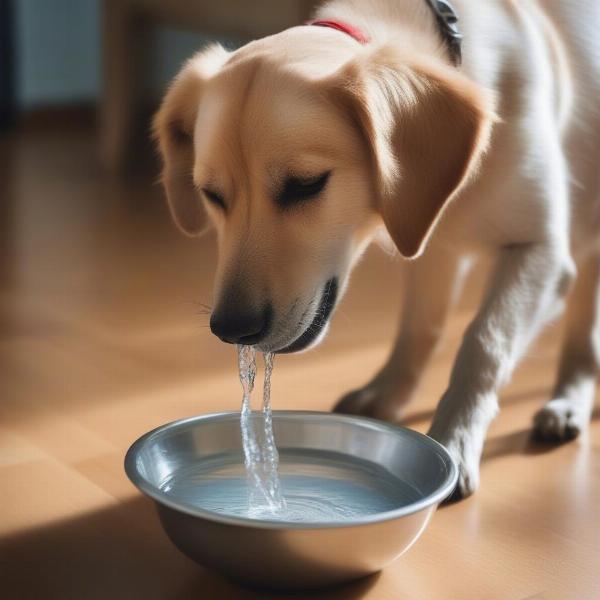The dogs pooping puzzle can be perplexing for many owners. From consistency and frequency to location and even color, dog poop can reveal a lot about your canine companion’s health. Understanding what’s normal and what’s not can help you address potential health issues early on and ensure your furry friend stays happy and healthy. This guide will delve into the mysteries of dog poop, providing you with practical advice on how to interpret your dog’s bowel movements and when to seek veterinary attention.
What’s Normal and What’s Not?
Healthy dog poop is generally brown, firm but not too hard, and easy to pick up. It shouldn’t be excessively watery or dry and crumbly. The frequency of bowel movements can vary depending on the dog’s age, diet, and activity level, but most dogs poop once or twice a day. Any significant changes in frequency, consistency, or color warrant further investigation. For instance, black, tarry stools can indicate bleeding in the upper digestive tract, while grey or yellow stools can signal liver or pancreatic problems.
Diet and the Dogs Pooping Puzzle
Diet plays a crucial role in your dog’s digestive health. A balanced, high-quality diet formulated for your dog’s specific needs can promote healthy bowel movements. Sudden changes in diet can lead to digestive upset and changes in stool consistency. If you need to switch your dog’s food, do so gradually over several days to allow their digestive system to adjust. Certain ingredients, such as high-fat content, can also contribute to looser stools.
Understanding Food Intolerances
Some dogs may have food intolerances or allergies that can manifest as digestive issues, including changes in poop. Common culprits include beef, chicken, dairy, and wheat. If you suspect a food intolerance, consult your veterinarian. They may recommend an elimination diet to identify the offending ingredient.
The Impact of Exercise and Hydration
Regular exercise and adequate hydration are essential for healthy digestion. Exercise helps stimulate bowel movements, while proper hydration ensures the stool isn’t too hard or dry. Encourage your dog to drink plenty of fresh water and provide regular opportunities for physical activity.
 Dog Drinking Water
Dog Drinking Water
When to Seek Veterinary Attention
While some variations in poop are normal, certain changes warrant a trip to the vet. Contact your veterinarian if you notice any of the following:
- Blood in the stool
- Black, tarry stools
- Persistent diarrhea or constipation
- Straining to defecate
- Loss of appetite
- Vomiting
- Lethargy
Conclusion
Decoding the dogs pooping puzzle is an important aspect of responsible dog ownership. By paying attention to your dog’s bowel movements, you can gain valuable insights into their overall health and well-being. Remember to monitor for any significant changes and consult your veterinarian if you have any concerns. pooping dogs puzzle can be indicative of various health issues, so early detection is key to ensuring prompt treatment and a happy, healthy pup.
FAQ
- How often should a dog poop? Most dogs poop once or twice a day, but this can vary.
- What color should dog poop be? Healthy dog poop is typically chocolate brown.
- What does watery dog poop mean? Watery poop can be a sign of dietary indiscretion, stress, or a more serious medical condition.
- Why is my dog’s poop black? Black, tarry stools can indicate bleeding in the upper digestive tract.
- What does it mean if my dog’s poop is white? White or grey poop can signal problems with the liver or pancreas.
- Should I be concerned if my dog is straining to poop? Yes, straining to defecate can be a sign of constipation or other issues and should be addressed by a veterinarian.
- Can I change my dog’s food if their poop is abnormal? A sudden change in diet can worsen digestive upset. Consult your veterinarian before making any dietary changes.
Expert Insight:
- “Dog poop is a valuable indicator of their overall health,” says Dr. Emily Carter, DVM. “Regular monitoring can help you catch potential problems early on.”
- “Diet plays a significant role in poop consistency,” adds Dr. David Lee, DVM. “Choosing a high-quality, balanced diet is essential for digestive health.” 101 dogs pooping puzzle
- “Don’t hesitate to contact your veterinarian if you notice any concerning changes in your dog’s bowel movements,” advises Dr. Sarah Miller, DVM. “Early intervention is key.” pup cups for dogs
ILM Dog is your trusted source for all things canine. We offer expert advice on dog breeds, health, training, nutrition, grooming, and more. From biliary in dogs to choosing the right pup for you, we’re here to help. Connect with us for personalized guidance: [email protected] or +44 20-3965-8624. ILM Dog is dedicated to providing comprehensive, reliable information to help you navigate the joys and challenges of dog ownership.